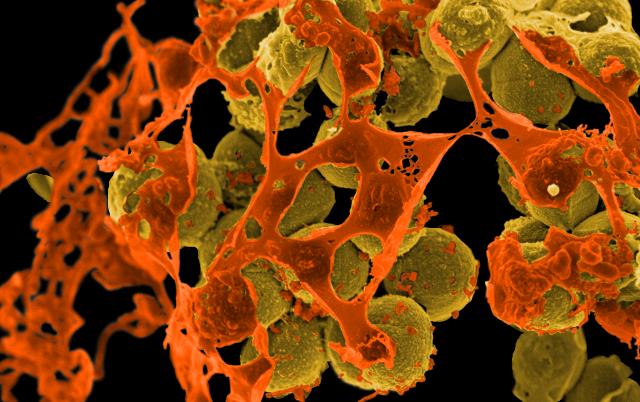
Scanning electron micrograph of methicillin-resistant Staphylococcus aureus, or MRSA, in brown spheres, surrounded by cellular debris. (NIAID, NIH)
24 June 2019. Tests of synthetic cannabidiol, or CBD, show the compound is as effective as current antibiotics against a class of microbes that includes Staphyloccocus and Streptococcus bacteria. Researchers from Queensland University in Brisbane and the company Botanix Pharmaceuticals in Perth, Australia described their results yesterday at the annual meeting of American Society for Microbiology in San Francisco.
The team led by Queensland’s Mark Blaskovich, a research chemist with the university’s Centre for Superbug Solutions, is seeking new tools to combat the growing problem of antibiotic resistance, the evolution of bacteria into organisms that do not respond conventional antibiotics. As the authors state, “New antimicrobial agents are urgently needed, particularly novel structural classes with new mechanisms of action that can overcome resistant strains.”
The researchers tested CBD as one of these new antimicrobial agents. CBD is a non-intoxicating chemical derived from the cannabis plant, also called marijuana, and widely studied as a treatment for neurological disorders. In June 2018, the Food and Drug Administration in the U.S. approved Epidiolex, a formulation of CBD to treat two severe forms of epilepsy.
Botanix Pharmaceuticals develops treatments for skin diseases, such as acne and atopic dermatitis or eczema, with compounds using a synthetic form of CBD, also non-intoxicating and without the need for cannabis plants. The company’s treatments, formulated as skin creams, target cannabinoid receptors in the body that regulate lipid or body oil production affecting inflammation and infection.
In this study, Blaskovich and colleagues tested synthetic CBD on a range of bacteria, both gram-positive and gram-negative. “Gram” refers to a classification for bacteria where the microbes either retain (gram-positive) or shed (gram-negative) a test stain on their protective cell coatings, with gram-positive bacteria having a thicker outer membrane that retains the stain. Gram-positive bacteria include Staphyloccocus aureus bacteria, responsible for skin and other infections in the body, and Streptococcus pneumoniae, responsible for pneumonia, meningitis, and other infections.
The researchers used standard bacterial testing procedures to test CBD against bacterial cultures, starting with broth microdilution, a basic test of antibiotic activity. The team also tested for susceptibility to resistance and activity against biofilms, communities of bacteria often difficult to eradicate. And with lab mice, the researchers tested CBD on infections of methicillin-resistant Staphylococcus aureus, or MRSA, a particularly difficult bacterium to treat.
The results show CBD particularly effective against gram-positive bacteria that include Staphyloccocus and Streptococcus microbes, but not gram-negative bacteria. With gram-positive bacteria, CBD is as fast and effective as the antibiotics vancomycin and daptomycin, but also works against resistant strains of staph and strep bacteria. And CBD is active against MRSA infections in lab mice. The tests show as well that CBD has a low propensity for resistance and is active against biofilms, including communities of MRSA bacteria.
The authors say that because of CBD’s anti-inflammatory properties, it has added value when formulated into an antibiotic treatment. “Given cannabidiol’s documented anti-inflammatory effects, existing safety data in humans, and potential for varied delivery routes, it is a promising new antibiotic worth further investigation,” notes Blaskovich in an American Society for Microbiology statement. Botanix assigned the code-name BTX 1801 that the company plans to develop into an antibiotic to complement its current line of skin disease treatments.
More from Science & Enterprise:
- Antibiotics Synthesized from Scorpion Venom
- Synthetic Cannabidiol Shown to Reduce Seizures
- Portable Sequencer Identifies Drug-Resistant Bacteria
- Antibiotic Prevents Staph Colonies in Newborns
- Rapid Antimicrobial Resistance Diagnostics System Advances
* * *

 RSS - Posts
RSS - Posts
You must be logged in to post a comment.